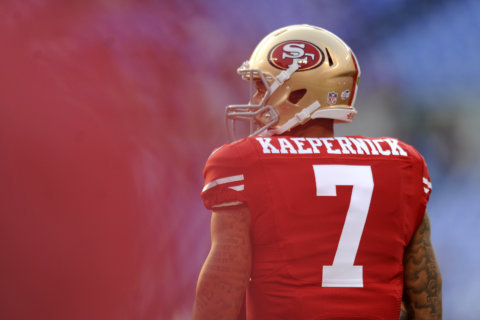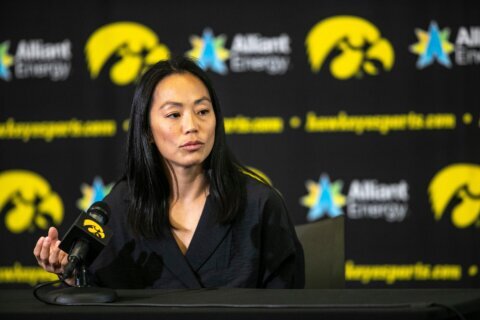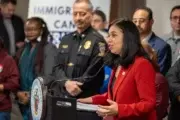WASHINGTON — “When people agree with you, there’s no problem.”
With those eight words, former Washington Wizards player Etan Thomas summed up the state of sports activism in 2018 as succinctly as anyone could at an Aspen Institute panel this week.
Colin Kaepernick’s protest and everything that has come with it — from his excising from the league to encouragement from the President to punish anyone showing solidarity — have split the American public into two camps, ever more entrenched and vitriolic against one another, the message itself lost in the din of culture war battles.
While Kaepernick’s was far from the first example of activism in American sports, it was the first one we’d seen so publicly, on such a prominent stage, in quite a while. And while it lives on through the Nike ad campaign (which one can view as iconoclastic, opportunistic or both), it has undoubtedly impacted activism in sports at other levels.
One of Thomas’ fellow panelists was Ellis McKennie, a member of the University of Maryland football team. When it was announced that Maryland was retaining head coach DJ Durkin despite the death of Jordan McNair on his watch, it was reported that three players walked out of the meeting where the team was told the news. McKennie was one of those three, and was not shy about expressing his feelings on social media.
Every Saturday my teammates and I have to kneel before the memorial of our fallen teammate. Yet a group of people do not have the courage to hold anyone accountable for his death. If only they could have the courage that Jordan had. It’s never the wrong time to do what’s right. pic.twitter.com/AaZVmLGTtS
— Ellis McKennie (@emck_cubed97) October 30, 2018
But he didn’t see his action as activism, just as the thing he needed to do.
“I felt like I was standing up for my friend and his family,” McKennie said of McNair, a teammate and classmate not only in College Park, but also at McDonogh School.
It was vital to McKennie that his teammates not feel like he was abandoning them through his act, though. The meeting where it was announced Durkin was returning (he was finally let go the next day, only after severe public backlash) was sprung on the players, without warning, right before practice. Though he walked out, McKennie returned later for practice.
“I went back in the locker room that day, and guys were like, ‘You know, if a couple more people would have stood up, I would have come, too,’” he told WTOP. “But it’s hard. It’s hard being a college football player. It’s hard having 105 guys trying to get on the same page. It’s hard risking so much. For a lot of guys, this is it. This is your only chance to get a college degree. This is your only chance to get to the NFL, you know? So it’s hard to risk all that for something.”
Football is particularly cruel, in that regard. There’s such a natural attrition in the sport’s fabric that just to reach a high Division I level, a player is already a survivor. Walking out of that meeting could well have meant the end of his football career. McKennie doesn’t begrudge his teammates that didn’t join him, but was prepared to make that sacrifice for himself to stand up for something he believed in.
“If you’ve worked your whole life for something, you don’t want to give it up,” he said. “But I felt like this was so important. Jordan lost his life, and his family deserved something that was right. I did weigh risk and reward, and I thought the risk was worth it.”
McKennie isn’t the only amateur football player in the D.C. area who used his platform to stand up for something bigger than himself this season. While players at various schools around the nation have followed Kaepernick’s lead and knelt during the national anthem to draw attention to police brutality, the players at Capital Christian Academy in Lanham, Maryland decided to do so as a team this year.
The story got some national attention, but the reasons behind the decision were far more personal than promotional. Josiah Gill and Richard Johnson felt like it was important to teach the younger members of their own team the importance of what was happening in the outside world, how it might affect them personally, and to educate them on how to protect and keep themselves safe.
It wasn’t about putting themselves under a spotlight as much as educating the next generation.
“I talk about it with a lot of my friends,” said Johnson. “I try to make sure to tell the freshmen, the sophomores, the younger guys, to really just pay attention to who you’re getting in the car with and how to interact with the police, because I know there might not always be someone who tells them that in their lives. So I always just try to look out for them.”
When the players approached head coach Cornell Wade with the idea, he was surprised, but more than anything felt appreciative.
“I was proud of the guys for wanting to take a stand for something, for wanting to be a part of a bigger movement,” said Wade. “Then it was a little bit of fear. I wanted to make sure that they understood why they were doing what they were doing and the full ramifications of those things.”
So he imposed two mandates: Everyone on the team had to be on board, and they had to kneel every game. At first, a number of the younger kids were confused and afraid that an assistant coach — a former Marine — would be offended (he wasn’t).
So they didn’t do it. But Johnson and Gill, the latter of which had been pulled over recently for doing nothing more than playing music loud, were undeterred.
“I knew that we couldn’t do individual things,” said Gill. “So I said, OK, we’re not going to do it yet.”
They talked about it in a team meeting and went around the room, each player sharing his own experience, either personal or through family or friends, dealing with police brutality or profiling. Gill says he was surprised by what some of the players said and who spoke up, but that was the whole point.
“I wanted everybody to have a reason behind doing it,” he said.
Their next game, all the way up in Hancock, Maryland, sandwiched between the West Virginia and Pennsylvania borders along I-70, they all took a knee, together.
“It gave me a certain level of comfort to know that they weren’t just doing this because they saw it on TV, they were doing it because they actually felt something around it,” said Wade. “I think there’s an opportunity for my guys to experience something a lot of people don’t ever get a chance to experience. There’s a valuable lesson in standing up for something you believe in and seeing that through.”
That’s not to say that a simple act always affects institutional change, or that justice is necessarily being fully served. Just a month after leaving Maryland, Durkin has latched on as an assistant for Alabama, the top football program in the country. Kaepernick’s movement has become greater than himself, but he remains blackballed from the NFL. But even at the college and high school levels, players have shown themselves willing to put larger issues above football at personal risk to themselves, even as some of the institutions they are associated with fail to do the same.






